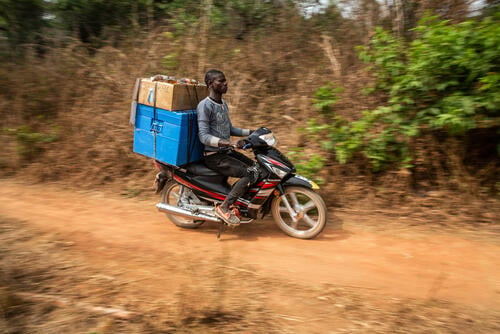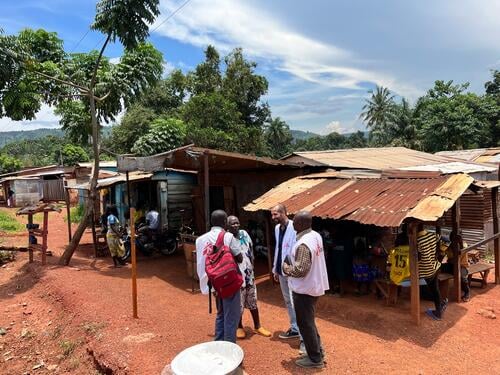After the deadly civil war that took place in 2013-2014, the Central African Republic enjoyed a period of relative calm, despite sporadic episodes of violence. Fighting between the government and non-state armed groups, spurred by an election process, escalated in early 2021. Today, the country is trying to move toward a stabilisation process, with the support of international forces that are taking back main cities and pushing the fighting into the bush.
The United Nations estimated that 63 per cent of people in CAR needed humanitarian assistance in 2022.OCHA, https://reports.unocha.org/fr/country/car/
Normal
0
21
false
false
false
FR-CH
X-NONE
X-NONE
/* Style Definitions */
table.MsoNormalTable
{mso-style-name:"Table Normal";
mso-tstyle-rowband-size:0;
mso-tstyle-colband-size:0;
mso-style-noshow:yes;
mso-style-priority:99;
mso-style-parent:"";
mso-padding-alt:0cm 5.4pt 0cm 5.4pt;
mso-para-margin-top:0cm;
mso-para-margin-right:0cm;
mso-para-margin-bottom:8.0pt;
mso-para-margin-left:0cm;
line-height:107%;
mso-pagination:widow-orphan;
font-size:11.0pt;
font-family:"Calibri",sans-serif;
mso-ascii-font-family:Calibri;
mso-ascii-theme-font:minor-latin;
mso-hansi-font-family:Calibri;
mso-hansi-theme-font:minor-latin;
mso-bidi-font-family:"Times New Roman";
mso-bidi-theme-font:minor-bidi;
mso-fareast-language:EN-US;}
With a population of 4.9 million people, more than a million are either internally displaced or have become refugees. Intense fighting in rural areas has left civilians living in fear and needing to flee their homes. People that go to displacement sites are met with deplorable conditions, made worse by very limited access to basic needs, such as food, clean water, and sanitation.
The health system in the Central African Republic is barely functioning, due to a severe shortage of skilled health workers, medical supplies, and facilities. Limited access to healthcare means that preventable diseases continue to take a toll.
What we do
MSF health facilities are the only places for people to seek treatment free of charge in many regions. We run 13 basic and specialist healthcare projects across the country, which provide much needed support for maternal and child health, malnutrition, surgery, sexual violence, treatment for HIV/AIDS, tuberculosis, malaria, mental health, and disease outbreaks. The conflict poses immense challenges for our teams to deliver healthcare, but we are able to provide assistance in multiple regions of the country.
Malaria
Malaria remains one of the biggest public health challenges in the country. Malaria transmission rates are high throughout the year and peak during the rainy season. The limited access to healthcare means that few people are formally diagnosed in a health facility using a diagnostic test, pointing to significant gaps in access to basic medical care.
HIV/AIDS
The Central African Republic has a high HIV prevalence and low rates of antiretroviral coverage. HIV/AIDS is a leading cause of death among adults in the country and our teams are working to make treatment more available for long-term patients.
Our teams also work with the Ministry of Health to set up community-based patient groups that help people manage the challenges of living with HIV and adhere to treatment. This strategy is particularly effective in a country where healthcare access is challenging, and stigmatisation is high.

Vaccination campaigns
Vaccination continues to be the best prevention for infectious diseases, however, many children in CAR still have not received routine vaccinations.
In view of the epidemic risks due to the conflict and internal displacement, MSF teams regularly participate in preventive and reactive vaccination campaigns, in collaboration with the Ministry of Health.
Eureca, our emergency response team in CAR, often travels the country to provide emergency vaccination in outbreaks. We also provide vaccination services in the health facilities where we were working, with the aim to provide children under the age of five with up to nine antigens. Our teams also carry out additional preventive measures, such as distributing vitamin A tablets, bed nets, anti-parasite treatment, and providing screening for malnutrition.
Sexual and reproductive healthcare
Maternal, infant, and neonatal mortality rates in CAR remain among the highest in the world. Many of these deaths could be avoided by ensuring women have access to appropriate care during pregnancy and childbirth. Many women die from the consequences of obstetric complications and unsafe abortions.
In Bangui and in the hinterland, we provide sexual and reproductive health services, including medical care for complicated deliveries and neonatal care, family planning services, and safe abortion care.
Sexual violence
Sexual violence remains a taboo in society, although it is a health emergency. Fearing stigmatisation, reprisals, or humiliation, victims and survivors are often silent. MSF teams see this as a priority and has integrated support for victims and survivors of sexual violence in almost all our projects across the country. We offer accessible, free, and confidential medical and psychological support to victims and survivors, without discrimination.



